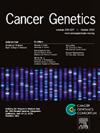43.体细胞嵌合紊乱相关变异的分类挑战与准则制定
IF 1.4
4区 医学
Q4 GENETICS & HEREDITY
引用次数: 0
摘要
体细胞嵌合紊乱(DSM)是一种罕见的遗传疾病,其特点是杂合子后事件导致疾病的节段性分布。相关表型的早期表现往往与种系疾病相似,从而使分子诊断变得复杂。此外,美国医学遗传学和基因组学学院(ACMG)和分子病理学协会(AMP)的现行指南特别关注种系变异和癌症变异,这使得对 DoSM 相关体细胞变异的解释变得复杂。临床基因组学脑畸形专家组指南》(ClinGen Brain Malformation Expert Panel guidelines)对大脑特异性体细胞嵌合性疾病进行了有价值的更新,但它们对不同的 DoSM 表现形式的适用性是有限的。在华盛顿大学医学院,我们发现了将 ACMG/AMP 基因指南应用于 DoSM 变异的不足之处,这促使我们制定了 DoSM 特异性变异解释指南。利用我们实验室在体细胞变异解读方面的丰富经验,我们制定了适用于非癌症体细胞检测相关基因和临床环境的 DoSM 指南。这些指南满足了在DoSM中准确解读体细胞变异的关键需求,在DoSM中,治疗的进展取决于对DoSM中体细胞变异与肿瘤之间重叠的理解。这一综合框架弥补了现有指南的不足,为从事非癌症体细胞检测的临床实验室提供了宝贵的资源,并推动了DoSM患者的精准医疗。我们将介绍已制定的指南,讨论DoSM和标准制定所面临的挑战,以及DoSM特定指南对准确诊断至关重要的有趣案例研究。本文章由计算机程序翻译,如有差异,请以英文原文为准。
43. Challenges of classifying variants associated with disorders of somatic mosaicism and guideline creation
Disorders of somatic mosaicism (DoSM) constitute rare genetic disorders characterized by post-zygotic events leading to segmental distribution of disease. The early presentation of associated phenotypes often mimics germline diseases, complicating molecular diagnosis. Additionally, current guidelines from the American College of Medical Genetics and Genomics (ACMG) and the Association for Molecular Pathology (AMP) focus specifically on germline and cancer variants, complicating the interpretation of DoSM-associated somatic variation. The ClinGen Brain Malformation Expert Panel guidelines have created valuable updates to account for brain-specific disorders of somatic mosaicism, but their applicability to the diverse DoSM presentations is limited. At Washington University School of Medicine, we have identified shortcomings in applying ACMG/AMP germline guidelines to DoSM variants, prompting the development of DoSM-specific variant interpretation guidelines. Leveraging our laboratory's extensive experience in somatic variation interpretation, we have developed DoSM guidelines that are applicable across genes and clinical contexts pertinent to non-cancerous somatic testing. These guidelines address the critical need for accurate somatic variant interpretation in DoSM, where treatment advances hinge on understanding the overlap between somatic variants in DoSM and tumors. This comprehensive framework addresses the gap in existing guidelines, offering an iinvaluable resource for clinical laboratories engaged in non-cancerous somatic testing and advancing precision medicine for patients with DoSM. We will present the developed guidelines, discuss challenges specific to DoSM and criteria development, and interesting cases studies where DoSM-specific guidelines were critical to accurate diagnosis.
求助全文
通过发布文献求助,成功后即可免费获取论文全文。
去求助
来源期刊

Cancer Genetics
ONCOLOGY-GENETICS & HEREDITY
CiteScore
3.20
自引率
5.30%
发文量
167
审稿时长
27 days
期刊介绍:
The aim of Cancer Genetics is to publish high quality scientific papers on the cellular, genetic and molecular aspects of cancer, including cancer predisposition and clinical diagnostic applications. Specific areas of interest include descriptions of new chromosomal, molecular or epigenetic alterations in benign and malignant diseases; novel laboratory approaches for identification and characterization of chromosomal rearrangements or genomic alterations in cancer cells; correlation of genetic changes with pathology and clinical presentation; and the molecular genetics of cancer predisposition. To reach a basic science and clinical multidisciplinary audience, we welcome original full-length articles, reviews, meeting summaries, brief reports, and letters to the editor.
 求助内容:
求助内容: 应助结果提醒方式:
应助结果提醒方式:


